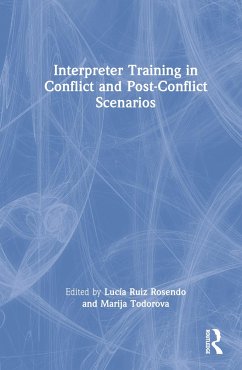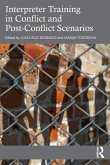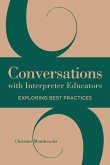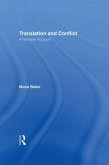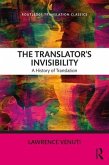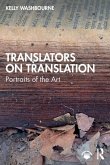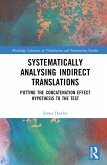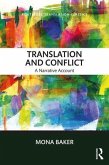Interpreter Training in Conflict and Post-Conflict Scenarios
Herausgeber: Ruiz Rosendo, Lucía; Todorova, Marija
Interpreter Training in Conflict and Post-Conflict Scenarios
Herausgeber: Ruiz Rosendo, Lucía; Todorova, Marija
- Gebundenes Buch
- Merkliste
- Auf die Merkliste
- Bewerten Bewerten
- Teilen
- Produkt teilen
- Produkterinnerung
- Produkterinnerung
This volume is structured around interpreter training in different contexts of conflict and post-conflict, from military operations and international tribunals to asylum-seeking and refugees, humanitarian and human rights missions.
Andere Kunden interessierten sich auch für
![Interpreter Training in Conflict and Post-Conflict Scenarios Interpreter Training in Conflict and Post-Conflict Scenarios]() Interpreter Training in Conflict and Post-Conflict Scenarios45,99 €
Interpreter Training in Conflict and Post-Conflict Scenarios45,99 €![Conversations with Interpreter Educators: Exploring Best Practices Volume 9 Conversations with Interpreter Educators: Exploring Best Practices Volume 9]() Christine MonikowskiConversations with Interpreter Educators: Exploring Best Practices Volume 930,99 €
Christine MonikowskiConversations with Interpreter Educators: Exploring Best Practices Volume 930,99 €![Translation and Conflict Translation and Conflict]() Mona BakerTranslation and Conflict160,99 €
Mona BakerTranslation and Conflict160,99 €![The Translator's Invisibility The Translator's Invisibility]() Lawrence VenutiThe Translator's Invisibility45,99 €
Lawrence VenutiThe Translator's Invisibility45,99 €![Translators on Translation Translators on Translation]() Kelly WashbourneTranslators on Translation55,99 €
Kelly WashbourneTranslators on Translation55,99 €![Systematically Analysing Indirect Translations Systematically Analysing Indirect Translations]() James Luke HadleySystematically Analysing Indirect Translations168,99 €
James Luke HadleySystematically Analysing Indirect Translations168,99 €![Translation and Conflict Translation and Conflict]() Mona BakerTranslation and Conflict40,99 €
Mona BakerTranslation and Conflict40,99 €-
-
-
This volume is structured around interpreter training in different contexts of conflict and post-conflict, from military operations and international tribunals to asylum-seeking and refugees, humanitarian and human rights missions.
Hinweis: Dieser Artikel kann nur an eine deutsche Lieferadresse ausgeliefert werden.
Hinweis: Dieser Artikel kann nur an eine deutsche Lieferadresse ausgeliefert werden.
Produktdetails
- Produktdetails
- Verlag: Taylor & Francis Ltd
- Seitenzahl: 226
- Erscheinungstermin: 29. November 2022
- Englisch
- Abmessung: 234mm x 156mm x 14mm
- Gewicht: 474g
- ISBN-13: 9781032136592
- ISBN-10: 1032136596
- Artikelnr.: 65614612
- Herstellerkennzeichnung
- Libri GmbH
- Europaallee 1
- 36244 Bad Hersfeld
- gpsr@libri.de
- Verlag: Taylor & Francis Ltd
- Seitenzahl: 226
- Erscheinungstermin: 29. November 2022
- Englisch
- Abmessung: 234mm x 156mm x 14mm
- Gewicht: 474g
- ISBN-13: 9781032136592
- ISBN-10: 1032136596
- Artikelnr.: 65614612
- Herstellerkennzeichnung
- Libri GmbH
- Europaallee 1
- 36244 Bad Hersfeld
- gpsr@libri.de
Lucía Ruiz Rosendo is an associate professor at the University of Geneva's Interpreting Department. She has co-edited Interpreting Conflict (Palgrave 2021). Her research has appeared in Linguistica Antverpiensia, Target, War & Society and Armed Forces & Society, among others. She is the coordinator of the project AXS. Marija Todorova is a research assistant professor at the Department of Translation, Interpreting, and Intercultural Studies at Hong Kong Baptist University. She has authored Translation of Violence in Children's Literature (Routledge 2022) and co-edited Interpreting Conflict (Palgrave 2021). She is editor of New Voices in Translation Studies.
List of Contributors
1. Introduction
Lucía Ruiz Rosendo and Marija Todorova
Part I. Training interpreters for the military
2. Ethics in military interpreter training
Pekka Snellman
3. Military interpreter training for context-specific situations
Magnus Dahnberg
4. Training interpreters servicing China's Peacekeeping Forces
Zerong Wei and Luo Tian
Part II. Training interpreters in the context of international
organisations and tribunals
5. Developing interpreter competence: Training interpreters servicing UN
field missions
Alma Barghout and Lucía Ruiz Rosendo
6. Resourcefulness when resources are lacking: A case study of field
interpreters at the Office of the Prosecutor at the International Criminal
Court
Nada Melhem, Nathalie Collart and Dimitri Elman
7. Main challenges of interpreting in the context of the international
protection determination procedures
Michele Arcella
Part III. Training interpreters to work with refugees in national and
regional contexts
8. Training needs of interpreters in the refugee crisis in Africa
Ebenezer Tedjouong and Marija Todorova
9. Interpreting for vulnerable populations: Training and education of
interpreters working with refugee children in the United States
Indira Sultani¿
10. Interpreter training in an asylum context
Sonja Pöllabauer
11. Ethics and training of interpreters in the asylum context
Fabrizio Gallai
12. Technology affordances in training interpreters for asylum seekers and
refugees
Mariachiara Russo and Nicoletta Spinolo
Part IV. Crosscutting implications of interpreter training in conflict and
post-conflict scenarios
13. Interpreting trauma: Service providers' and interpreters' perspectives
Simo K. Määttä
14. The psychological implications of interpreting in conflict zones,
elements for potential mental-health and self-care training for
interpreters
Eleonora Bernardi
15. Enhancing short term memory for conflict zone interpreters
Anjad A. Mahasneh
1. Introduction
Lucía Ruiz Rosendo and Marija Todorova
Part I. Training interpreters for the military
2. Ethics in military interpreter training
Pekka Snellman
3. Military interpreter training for context-specific situations
Magnus Dahnberg
4. Training interpreters servicing China's Peacekeeping Forces
Zerong Wei and Luo Tian
Part II. Training interpreters in the context of international
organisations and tribunals
5. Developing interpreter competence: Training interpreters servicing UN
field missions
Alma Barghout and Lucía Ruiz Rosendo
6. Resourcefulness when resources are lacking: A case study of field
interpreters at the Office of the Prosecutor at the International Criminal
Court
Nada Melhem, Nathalie Collart and Dimitri Elman
7. Main challenges of interpreting in the context of the international
protection determination procedures
Michele Arcella
Part III. Training interpreters to work with refugees in national and
regional contexts
8. Training needs of interpreters in the refugee crisis in Africa
Ebenezer Tedjouong and Marija Todorova
9. Interpreting for vulnerable populations: Training and education of
interpreters working with refugee children in the United States
Indira Sultani¿
10. Interpreter training in an asylum context
Sonja Pöllabauer
11. Ethics and training of interpreters in the asylum context
Fabrizio Gallai
12. Technology affordances in training interpreters for asylum seekers and
refugees
Mariachiara Russo and Nicoletta Spinolo
Part IV. Crosscutting implications of interpreter training in conflict and
post-conflict scenarios
13. Interpreting trauma: Service providers' and interpreters' perspectives
Simo K. Määttä
14. The psychological implications of interpreting in conflict zones,
elements for potential mental-health and self-care training for
interpreters
Eleonora Bernardi
15. Enhancing short term memory for conflict zone interpreters
Anjad A. Mahasneh
List of Contributors
1. Introduction
Lucía Ruiz Rosendo and Marija Todorova
Part I. Training interpreters for the military
2. Ethics in military interpreter training
Pekka Snellman
3. Military interpreter training for context-specific situations
Magnus Dahnberg
4. Training interpreters servicing China's Peacekeeping Forces
Zerong Wei and Luo Tian
Part II. Training interpreters in the context of international
organisations and tribunals
5. Developing interpreter competence: Training interpreters servicing UN
field missions
Alma Barghout and Lucía Ruiz Rosendo
6. Resourcefulness when resources are lacking: A case study of field
interpreters at the Office of the Prosecutor at the International Criminal
Court
Nada Melhem, Nathalie Collart and Dimitri Elman
7. Main challenges of interpreting in the context of the international
protection determination procedures
Michele Arcella
Part III. Training interpreters to work with refugees in national and
regional contexts
8. Training needs of interpreters in the refugee crisis in Africa
Ebenezer Tedjouong and Marija Todorova
9. Interpreting for vulnerable populations: Training and education of
interpreters working with refugee children in the United States
Indira Sultani¿
10. Interpreter training in an asylum context
Sonja Pöllabauer
11. Ethics and training of interpreters in the asylum context
Fabrizio Gallai
12. Technology affordances in training interpreters for asylum seekers and
refugees
Mariachiara Russo and Nicoletta Spinolo
Part IV. Crosscutting implications of interpreter training in conflict and
post-conflict scenarios
13. Interpreting trauma: Service providers' and interpreters' perspectives
Simo K. Määttä
14. The psychological implications of interpreting in conflict zones,
elements for potential mental-health and self-care training for
interpreters
Eleonora Bernardi
15. Enhancing short term memory for conflict zone interpreters
Anjad A. Mahasneh
1. Introduction
Lucía Ruiz Rosendo and Marija Todorova
Part I. Training interpreters for the military
2. Ethics in military interpreter training
Pekka Snellman
3. Military interpreter training for context-specific situations
Magnus Dahnberg
4. Training interpreters servicing China's Peacekeeping Forces
Zerong Wei and Luo Tian
Part II. Training interpreters in the context of international
organisations and tribunals
5. Developing interpreter competence: Training interpreters servicing UN
field missions
Alma Barghout and Lucía Ruiz Rosendo
6. Resourcefulness when resources are lacking: A case study of field
interpreters at the Office of the Prosecutor at the International Criminal
Court
Nada Melhem, Nathalie Collart and Dimitri Elman
7. Main challenges of interpreting in the context of the international
protection determination procedures
Michele Arcella
Part III. Training interpreters to work with refugees in national and
regional contexts
8. Training needs of interpreters in the refugee crisis in Africa
Ebenezer Tedjouong and Marija Todorova
9. Interpreting for vulnerable populations: Training and education of
interpreters working with refugee children in the United States
Indira Sultani¿
10. Interpreter training in an asylum context
Sonja Pöllabauer
11. Ethics and training of interpreters in the asylum context
Fabrizio Gallai
12. Technology affordances in training interpreters for asylum seekers and
refugees
Mariachiara Russo and Nicoletta Spinolo
Part IV. Crosscutting implications of interpreter training in conflict and
post-conflict scenarios
13. Interpreting trauma: Service providers' and interpreters' perspectives
Simo K. Määttä
14. The psychological implications of interpreting in conflict zones,
elements for potential mental-health and self-care training for
interpreters
Eleonora Bernardi
15. Enhancing short term memory for conflict zone interpreters
Anjad A. Mahasneh

